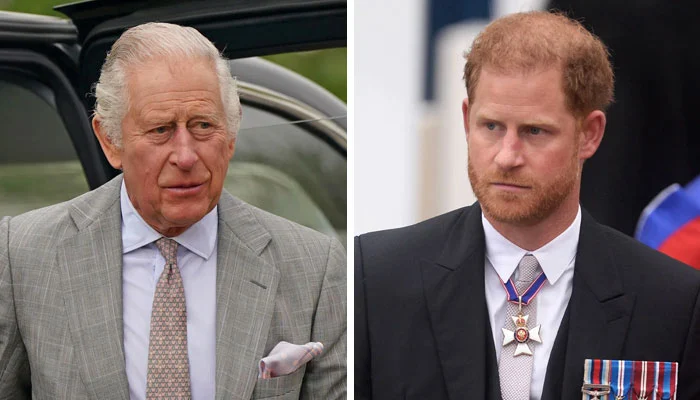Table of Contents
ToggleKing Charles Is Reportedly Furious with Prince Harry: A Royal Family Rift Deepens
Image Credit: The News International
Introduction:
The British royal family has long been the subject of public fascination, with its traditions, pomp, and occasional scandals captivating audiences worldwide. In recent years, however, the spotlight has shifted to the strained relationship between King Charles III and his youngest son, Prince Harry. Reports now suggest that the King is “furious” with Harry over his continued public revelations about royal life, further straining a relationship already fraught with tension.
Read Also: royal biographer slams prince harry for snub of king charles
The Alleged Fallout:
According to royal insiders, King Charles’ frustration stems from Prince Harry’s latest remarks and actions that seem to criticize the monarchy. These include Harry’s candid interviews, his controversial memoir “Spare,” and his ongoing Netflix series, where he and his wife Meghan Markle share intimate details about their struggles within the royal family.
Sources close to the King indicate that he perceives these actions as deeply disrespectful, particularly as they come at a time when Charles is solidifying his role as the new monarch. The timing of Harry’s revelations has reportedly left the King feeling betrayed and under immense pressure to maintain the monarchy’s image.
A History of Strained Relations:
The relationship between King Charles and Prince Harry has not always been harmonious. While their bond was reportedly close during Harry’s childhood, tensions began to surface as Harry grew older. The young prince often felt overshadowed by royal duties and struggled to find his own identity within the confines of the institution.
The situation worsened when Harry married Meghan Markle, an event that some see as a turning point in his relationship with the family. The couple’s decision to step back from royal duties in 2020, often referred to as “Megxit,” marked a significant break from tradition and further alienated them from the royal fold.
Prince Harry’s Tell-All Memoirs:
One of the most explosive points in this ongoing drama was the release of Prince Harry’s memoir, Spare, in early 2023. In the book, Harry painted a less-than-flattering picture of his father, recounting incidents that portrayed Charles as emotionally distant and occasionally dismissive.
The memoir also included claims about Harry’s brother, Prince William, which further fractured family relations. While Harry has defended his decision to share his truth, many in the royal circle view his actions as a betrayal of the family’s long-held tradition of discretion.
The Role of Meghan Markle:
Meghan Markle’s presence in Harry’s life has been a polarizing factor. Critics of the Duchess of Sussex accuse her of encouraging Harry to distance himself from his family, while supporters argue that she has been unfairly scapegoated by the British press.
Regardless of public opinion, Meghan’s influence on Harry is undeniable. The couple has presented a united front, consistently advocating for transparency and social justice, even at the cost of their royal ties. For King Charles, however, their public criticism of the institution he now leads represents a personal and professional affront.
The Sussexes’ Public Statements:
Harry and Meghan’s decision to air their grievances publicly, from their Oprah Winfrey interview to their Netflix series, has added fuel to the fire. The revelations included allegations of racism within the royal family and accounts of feeling unsupported during Meghan’s mental health struggles.
For King Charles, these public statements are not just a personal attack—they are seen as damaging to the monarchy’s global reputation. The King is reportedly grappling with how to balance his personal feelings with his duty to preserve the institution.
King Charles’ Leadership Style:
As the reigning monarch, King Charles III is tasked with balancing personal grievances with the responsibilities of leading the United Kingdom and the Commonwealth. Known for his passion for tradition and his dedication to duty, Charles has spent decades preparing for his role as king. However, the ongoing tension with Prince Harry poses a unique challenge for his leadership.
Charles’ approach to leadership often reflects a blend of modern sensibilities and adherence to royal customs. Unlike Queen Elizabeth II, who was renowned for her stoic silence, Charles has occasionally shown a willingness to engage with controversies. Despite this, his patience seems to be wearing thin as Harry’s public remarks continue to overshadow the monarchy’s broader agenda.
Insiders suggest that Charles prefers handling family matters privately, viewing Harry’s public disclosures as a breach of trust. The King’s frustration is not just with the content of Harry’s remarks but also with their perceived intent to disrupt royal harmony during a critical period of transition for the monarchy.
The Palace’s Official Response:
Buckingham Palace has maintained its usual “no comment” stance on the feud between King Charles and Prince Harry. This silence, while typical of royal protocol, has left room for speculation and media scrutiny. Many royal experts believe that the palace is engaging in behind-the-scenes damage control to mitigate the impact of Harry’s revelations.
The absence of an official statement may be a strategic move to avoid escalating the situation. However, critics argue that this lack of transparency only fuels public curiosity and media sensationalism. The palace’s refusal to address Harry’s claims directly suggests that King Charles is prioritizing the institution’s stability over engaging in a public battle with his son.
Public Opinion on the Rift:
The public’s response to the ongoing royal rift is deeply divided. In the United Kingdom, many sympathize with King Charles, viewing Harry’s actions as disrespectful and unnecessary. Supporters of the monarchy believe that Harry’s public criticism undermines an institution that has long been a symbol of British heritage and continuity.
Conversely, Harry and Meghan have garnered significant support, particularly among younger audiences and in the United States. Advocates for the couple see their actions as courageous, highlighting important issues such as mental health, racism, and personal autonomy. This generational and cultural divide underscores the complex nature of the royal family’s challenges in an increasingly modern world.
The Impact on the Royal Institution:
The rift between King Charles and Prince Harry extends beyond personal conflict; it has far-reaching implications for the monarchy as an institution. With growing calls for transparency and reform, the monarchy faces mounting pressure to adapt to contemporary values.
Harry’s revelations have brought to light criticisms of the royal family’s insular culture, raising questions about its relevance in a modern democracy. For King Charles, the challenge lies in navigating these societal shifts while maintaining the monarchy’s historical significance. The ongoing feud with Harry risks further polarizing public opinion, potentially weakening the institution’s standing.
Prince Harry’s Perspective:
From Prince Harry’s point of view, his actions are driven by a desire to share his truth and protect his family. He has often spoken about the struggles he faced growing up in the royal spotlight, particularly the trauma of losing his mother, Princess Diana, at a young age.
Harry’s decision to distance himself from royal duties was largely motivated by a desire for freedom and a more peaceful life for his wife and children. However, his continued public criticisms suggest that unresolved grievances remain. Despite the backlash, Harry has expressed hope for reconciliation, emphasizing his love for his family even as he challenges the institution.
A Call for Reconciliation:
As the rift between King Charles and Prince Harry widens, many observers are calling for reconciliation. Family feuds are not uncommon, but the public nature of this dispute makes resolution all the more urgent. Prominent figures and royal commentators have suggested that a private meeting between father and son could be a step toward healing their relationship.
For reconciliation to occur, both parties would need to approach the situation with openness and mutual respect. Harry’s willingness to publicly share his experiences may stem from a desire to spark meaningful change within the monarchy, but it has undoubtedly caused pain for King Charles. Similarly, the King’s adherence to traditional royal values might appear inflexible, but it reflects his dedication to preserving an institution that has endured for centuries.
A genuine dialogue, free from the influence of media scrutiny, could help both sides find common ground. While the path to reconciliation is complex, it’s not impossible—especially if both Charles and Harry prioritize their familial bond over their differences.
The Role of Media in the Feud:
The media has played a significant role in amplifying the tensions between King Charles and Prince Harry. From tabloid headlines to in-depth documentaries, the press has scrutinized every aspect of their relationship. While Harry has often criticized the media for its invasive tactics, he has also used platforms like interviews and memoirs to share his side of the story.
This interplay between the royals and the media raises important ethical questions. Does the public’s right to know justify the intense coverage of a private family matter? Or should the media exercise greater restraint to allow the royal family to resolve its issues privately?
For King Charles, navigating this media landscape is particularly challenging. Any response to Harry’s claims risks further fueling the narrative, while silence can be perceived as indifference. The media’s role in shaping public perception underscores the delicate balance the monarchy must maintain to preserve its reputation.
Lessons from Other Royal Conflicts:
The British royal family has weathered its fair share of internal conflicts over the centuries. From the abdication crisis of King Edward VIII to Princess Diana’s tumultuous relationship with the monarchy, history offers lessons on how the institution can endure adversity.
In many cases, resolution has come through time, strategic communication, and a focus on duty. For instance, the Queen’s unwavering commitment to her role often served as a stabilizing force during moments of turmoil. King Charles might draw inspiration from his mother’s approach while also charting his own course as a modern monarch.
Learning from past disputes could provide valuable insights for addressing the current rift with Prince Harry. A combination of patience, empathy, and strategic decision-making may help the royal family move forward.
Read Also: royal biographer slams prince harry for snub of king charles
Conclusion:
The reported feud between King Charles and Prince Harry represents more than just a family disagreement—it’s a defining moment for the British monarchy. As the world watches, the royal family must navigate the delicate balance between tradition and modernity, private grievances, and public accountability.
While the path to reconciliation is fraught with challenges, it’s clear that both King Charles and Prince Harry have much to gain from mending their relationship. Whether through private dialogue or public gestures of goodwill, the opportunity for healing remains.
The question is not whether reconciliation is possible but whether both parties are willing to take the necessary steps to achieve it.
FAQs:
1. Why is King Charles reportedly angry with Prince Harry?
Reports suggest that King Charles is upset over Harry’s public criticisms of the royal family, particularly through his memoir Spare and other media appearances. These actions are perceived as damaging to the monarchy’s reputation.
2. How has the media influenced the royal feud?
The media has amplified tensions by covering every aspect of the rift in great detail. While Harry has used the media to share his perspective, it has also contributed to public scrutiny and speculation.
3. What are the long-term implications of this conflict for the monarchy?
The ongoing feud could weaken the monarchy’s image, especially among younger audiences. It also raises questions about the institution’s ability to adapt to contemporary values.
4. Could reconciliation between King Charles and Prince Harry happen?
Reconciliation is possible but would require openness, empathy, and a willingness from both sides to address their differences privately.
5. How does this rift compare to other royal family disputes?
The British royal family has faced numerous conflicts in the past, such as the abdication crisis and Princess Diana’s struggles. Lessons from these experiences highlight the importance of patience and strategic communication in resolving disputes.




